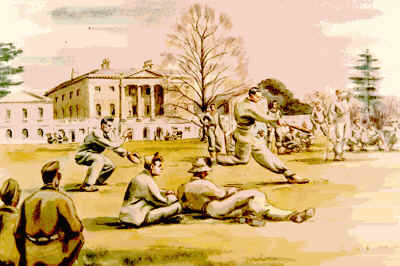

"BASEBALL ON THE MANOR HOUSE LAWN" by Olin Dows
World Series, 1968, Southeast Asia
By Dale Ritterbusch
Something Like A War
Ty Cobb said baseball is something
like a war, as if coming in with your spikes
sharpened and high were the equivalent
of flesh shredded by a fragmentation grenade
or a booby trapped 105 round. But the metaphor
doesn’t hold. Even if Albert Belle broke a shortstop’s
nose, dislocated his shoulder, and raked his spikes
along the bone from ankle to knee as Belle ran
out of his way between second and third,
it wouldn’t be even a mild skirmish between two friends
drunk on a Saturday night and looking for trouble.
Any good player could always pick himself up,
dust his uniform off, and play the next day—
baseball is nothing like a war.
Playing Baseball in the Army:
Company Picnic, 1967
We practiced for weeks
before playing the NCO’s
at the company picnic,
and the colonel warned,
They’ve got a pitcher, Sergeant Simms,
who will put a spin on the ball
so tight all you’ll do is pop up
to the infield—nine times out of ten.
And we did; we met Simms’ arrogant proficiency
the way we met the ball,
one easy pop up after another—
until, in the middle innings,
I cut it hard, sent it bounding over third
and waltzed in for a double.
I looked at him and grinned.
You won’t do that again, Lieutenant, he said,
but I did: Only I went the other way,
hit a sucker pitch between first and second—had to slide
as the right fielder broke in on the ball
making it a close one, and the hard tag stung,
leaving a welt for a week. Simms didn’t say anything, just stood on the mound rubbing the ball into his glove,
but he handed me a beer after the game,
and we talked of the great games we’d seen,
the ones we’d played, of players who made
impossible plays. When he didn’t come back
to his wife and son, the son he played catch with
after a long day on the ranges training recruits,
I remembered our company picnic, the game
we’d played that afternoon, and I still think
of those hard grounders, his pitches fast,
burning across the plate, nicking the corners
except that one easy mistake, chest high,
seeming to hang like a grenade
daring me to hit it. And I still call out
to the mound, Pitch it to me Sarge,
make it a good one, come on, pitch to me.
The air, the fading sun, hangs heavy over the plate.
Behind the Plate
Always the dumbest and fattest
kid played catcher—so slow
to first he was an easy out
even on a well hit grounder.
You had to be dumb, we thought,
to play that position—always the chance
of being hit with a foul tip
stinging face, hands, ankles
no matter how much protection,
and we didn’t have much.
And, too, it was best to be somewhat heavy
with thick arms and lumbering thighs
to take the bruise of an errant curve ball
sliced sharply off the plate
or a fast ball bounced wickedly into the groin.
So we were lucky to have someone
who wanted to catch,
and when the ball hit his knee with a hard crack,
he never complained. Always he would
walk it off, rubbing the sweat off his brow
with his sleeve. It was just part of the game,
like blocking the plate or taking one for the team.
Years later, if we ever thought about it,
we could still see him in his crouch
behind the plate, still see him going back
to the screen, ripping off his mask,
making certain catches of those high fouls
easily lost in the sun. And when he got his weight
into a pitch, he’d drive it deep,
broke a neighbor’s window once
with a line drive so far back
no one even tried to make the catch.
And because he was dumb and slow
he worked for a year after high school,
got married, was drafted and sent to Asia
to play in the big leagues—a utility player,
one of the boonie rats sent to catch
the hardest game we’d ever played.
When he got the Dear John from his wife,
he called for a fast one high and tight,
and just like always he got hit,
the sting so sharp, so deep,
he wouldn’t even try to walk it off.